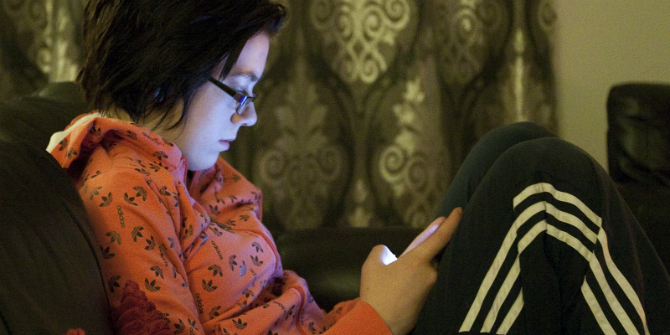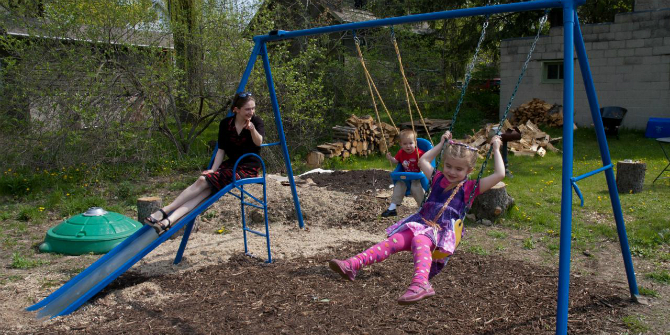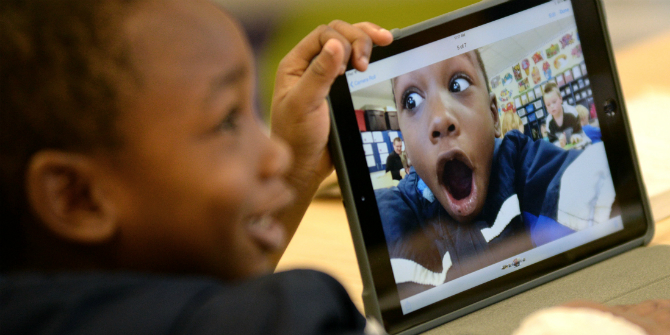 Credit: G. Clarke, CC BY-ND 2.0
Credit: G. Clarke, CC BY-ND 2.0
 Galina Soldatova and Vladimir Shlyapnikov look at how Russian parents’ awareness of online risks is changing, with a focus on communication, technology and content risks. There is, as always, a balance to be had between protection and opportunity. Galina is Professor and Vice-Dean of the Department of Psychology, Moscow State University (Lomonosov) and a Corresponding Fellow at the Russian Academy of Education. Vladimir is Director of Social Projects at the Foundation for Internet Development.
Galina Soldatova and Vladimir Shlyapnikov look at how Russian parents’ awareness of online risks is changing, with a focus on communication, technology and content risks. There is, as always, a balance to be had between protection and opportunity. Galina is Professor and Vice-Dean of the Department of Psychology, Moscow State University (Lomonosov) and a Corresponding Fellow at the Russian Academy of Education. Vladimir is Director of Social Projects at the Foundation for Internet Development.
Russian children and their parents perceive online risks in different ways. Adults are more worried about what their children may see on the internet than with whom they might communicate via social networking sites. As a result, they tend to overprotect their children from content risks while underestimating the communication risks. According to our data, this is one of the outcomes from the analysis of requests to the Russian helpline Kids Online for the five last years.
Kids Online was founded in 2009 by the Foundation of Internet Development and the Faculty of Psychology at Lomonosov Moscow State University, with information and organisational support from the authorities and IT companies. Its main goal is to provide information and psychological support for children and teenagers facing different problems online. Since 2009, helpline operators have received more than 15,000 calls and electronic messages, both from children and their parents, from all corners of the Russian Federation. Analysis of anonymous requests to the helpline provides us with invaluable information about problems Russian children are encountering online, allowing us to better understand the relationship between online risks and harm.
Communication: a zone of underestimated risks
Russian children call the helpline for a range of problems such as cyberbullying, sexual harassment or blackmail. According to our helpline statistics children and teenagers often suffer both from problems with people in their offline lives as well as online encounters. Although this experience upsets children greatly, most prefer to hide their problems from adults as they expect to be misunderstood or maybe even punished. Unfortunately, parents tend to underestimate the importance of communication risks, usually noticing a problem when it is too late and it cannot be solved without professional support.
Parents now need to understand that online communication has become an important part of children’s lives. According to the latest research, almost 90% of Russian schoolchildren use the internet every day, in contrast to only 50% of their parents. Moreover, only half of Russian parents are aware of their children’s online activity. The following graph summarises the frequency of internet use by Russian schoolchildren and their parents in 2013:
The best way to keep children from potentially dangerous on- and offline communication is a close and trusting relationship between parents and their children, although building this kind of relationship demands a lot of time and effort. Unsurprisingly, some parents prefer easier ways to keep tabs on their children by, for example, spying on them on social networking sites. But this may be damaging to their relationships, and they will become the last people their children will ask for help when facing problems online.
Technology: a zone of controlled risks
There are a variety of reasons for which children seek the support of the helpline. The following graph summarises the different online risk-type requests to the helpline from 2010 to 2014:
Viruses and other ‘malware’ are very common on the internet, and it is often only a matter of time until a child encounters one, which is why parents should prepare their children and their devices. Despite the availability of numerous anti-virus programs, many Russian children as well as their parents still don’t know that they need to not only protect their home PC, but also their smartphones and tablets. Many still use unprotected public Wi-Fi connections to transfer personal data.
There are a few ‘golden rules’ (which we discuss here in Russian) that let children avoid or minimise damage from malware, but parents should be supportive and patient in educating their children to follow these rules.
Content: a zone of overprotection
Unlike their children, parents most commonly call the helpline about content risks. During the last five years, only a few Russian children reached out for support via the helpline after having seen inappropriate content. Nevertheless, Russian parents are extremely concerned about the content their children might see on the internet. According to the many surveys we conducted for our study, the most worrisome content for Russian children is violence, spam and pornography. The latter is perhaps the most significant, as most adults see their main parental duty as protecting minors from pornography. Their pursuit for a safer internet for their children, however, sometimes leads to a neglect of the many unique opportunities that new technologies grant for children’s development and education.
Working together
Overall, during the last five years, Russian parents have come a long way from almost full ignorance to a good awareness about online risks. Nevertheless, as technology continues to progress and advance, new risks appear every day. Both children and parents must continuously work together to improve their digital skills and competence to master new technologies, hand in hand.







